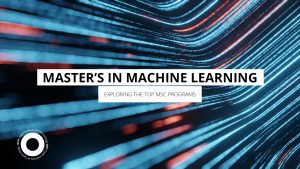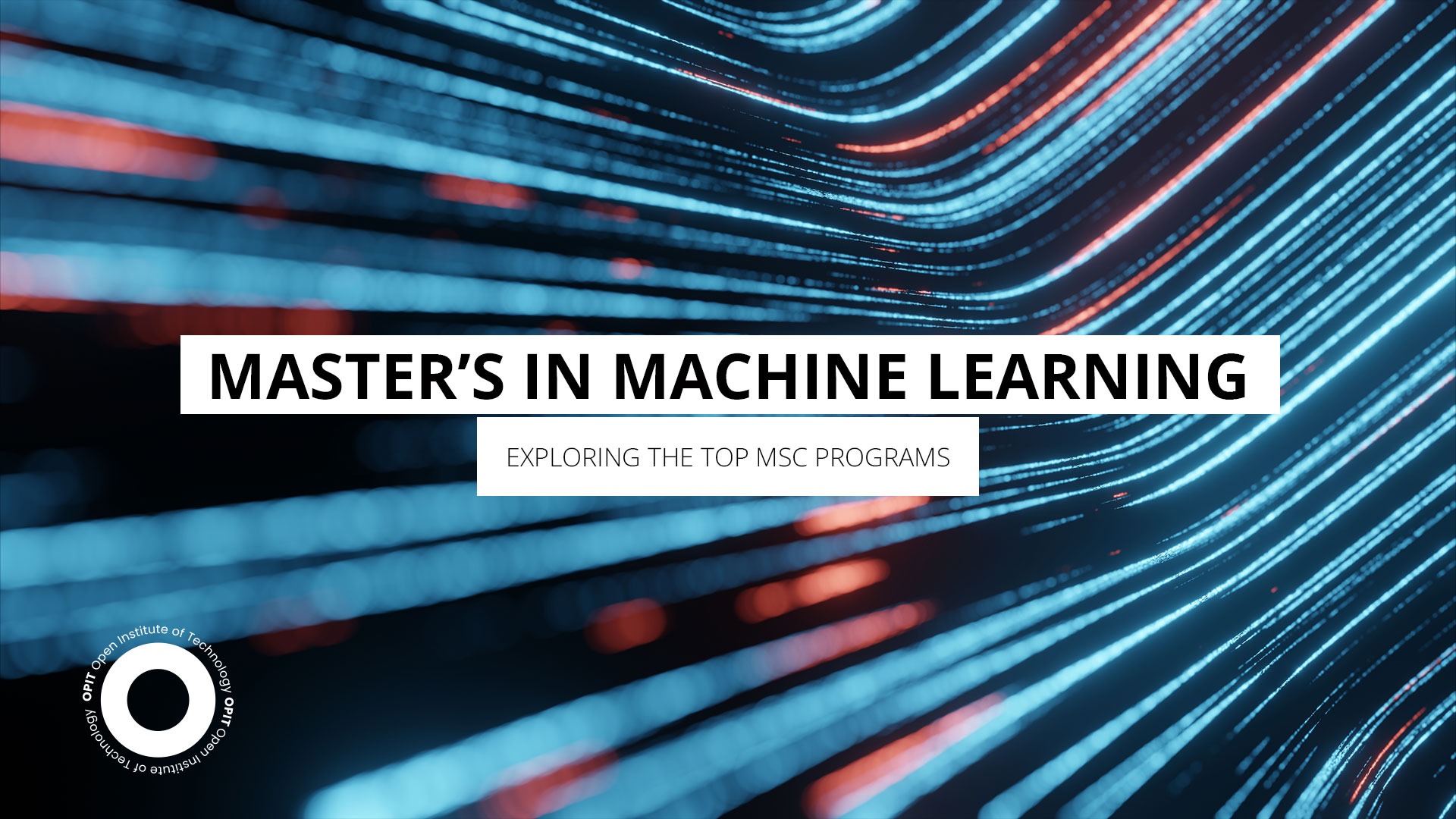

Anybody who’s ever given ChatGPT or a similar AI-powered software a whirl has seen machine learning in action. Today, we’re on the cusp of a computational revolution as computer systems are being taught to do more than simply follow processes. They can learn just like humans though they can only do so using algorithms and models designed to show them what to learn and how to draw conclusions.
Those who can master machines, or more accurately, the concepts of building digital brains for machines, stand to enjoy long and lucrative careers. Glassdoor tells us that the average machine learning engineer picks up €70,318 in Germany alone, with senior-level engineers picking up close to €90,000. But to get to the point where you can work in this field, you need a Master’s in machine learning to demonstrate that you know what you’re doing. This article looks at three of the best programs for European and international students.
Factors to Consider When Choosing a Masters in Machine Learning Program
Before we dig into the courses, it’s important to highlight what we’re looking for. After all, a certificate needs to be worth more than the paper on which it’s printed, serving as tangible proof that you have the machine learning chops prospective employers desire.
- University Reputation – A certificate from a university with a bad reputation is like word-of-mouth from a shyster – nobody trusts it. Any institution you choose needs to have a stellar reputation as a provider of high-quality programs.
- Course Curriculum – The general concept of machine learning branches off into many different paths and specializations, each of which takes you in different career directions. By examining the course curriculum, you confirm that your program leads you down the right path rather than being something that’ll force you to course-correct in the future.
- Faculty Expertise – The people who teach you need to have roots in the machine learning sector. Those roots can come from their experience in industry, academic success, or research, but they need to be there if your teachers are to provide the fuel to grow your academic seed.
- Industry Connections – Machine learning already permeates through any industry that relies on data (i.e., almost all of them), so you want a university that offers links to employers. Look for internship programs, lecturers with a history of real-world experience, and careers departments designed to help you get ahead.
- Tuition Fees – There’s no getting around the fact that a Master’s degree in any subject sets you back a few thousand euros. How many thousands depends on the nature of your course and the institution, so look for something that’s affordable and (where applicable) can provide financial aid.
Top Masters in Machine Learning Programs
With what to look for established, it’s time to look at a trio of Master’s in machine learning courses that fit the bill when examined under the lens of the above five factors.
Master of Science in Machine Learning and Data Science (Imperial College London)
Imperial College London has always held a high reputation in the UK (it was a fixture on the old show “University Challenge”) and its Master’s degree courses allow you to piggyback off that reputation. This Master’s is a 24-month program that’s offered 100% online, making it as accessible to international students as it is to English ones.
The program starts you off with theory and ethics, helping you understand the programming techniques and math that go into designing machine learning models. By the second year, you’ll start getting your feet wet with practical projects, develop mastery of unsupervised learning, and take on research projects to show you can apply what you’ve learned. The faculty has wide-ranging experience, led by Professor Michael Bronstein, the university’s Chair of Machine Learning and Pattern Recognition. His expertise has been called upon by the likes of the University of Oxford and Project CETI, meaning you’re in good hands from the course creation and guidance perspectives.
The downside is that this is an expensive course, costing international students £16,200 per year for a total of £32,400 (approx. €37,310 as of time of writing). That’s money well spent, considering you get a degree from a university that ranks sixth in the QS World University Rankings and has an alumni network that stretches to over 200,000 former students and faculty members. Financial assistance for those high tuition fees is available for Imperial’s Student Support Fund and Global Relief Fund, though both are only available to students who face unexpected financial hardship.
Master in Management of AI and Machine Learning (UBI Business School)
From a course focused primarily on theory, we move to one that takes a much more business-centric focus. UBI Business School has five-star ratings across the board from QS University World Rankings and delivers courses that help students harness their knowledge to meet the demands of modern industry.
Creating digital leads is the stated goal of the program, which it highlights through a curriculum developed by some of the world’s leading tech companies. The idea is simple – ask companies what they want and let them design a course that teaches it. First-stage students start with modules focusing on the psychology and ethics behind modern technology. By the second stage, those who choose the AI and machine learning specialization move into the fundamentals of AI, neural networks, and applying Python to large datasets. Finally, this MSc machine learning concludes with a management project, where you’ll complete a thesis and work directly either with an existing business or in the university’s Venture Creation Lab.
Tuition may be a sticking point because you need to pay €11,900 for the course, though you can get a discount if you pay upfront. UBI also offers scholarships based on merit and for special groups (i.e., people with special political associations). International students can also benefit from global inclusion and refugee scholarships designed to make education more accessible. The teaching staff, led by Dean and Professor Gaston Fornes, includes people who have over 15 years of professional experience, five of which are spent in senior leadership roles.
Master in Applied Data Science & AI (OPIT)
Don’t let the lack of the term “machine learning” in the degree’s name fool you – OPIT’s course leans heavily into machine learning. In the first term alone, you’ll learn about feature engineering, different machine learning models, and how to visualize data through Python and relevant coding libraries. But you’ll learn all of that in the context of how machine learning applies in data science, making the program ideal for practical people with one eye turned toward a data science career.
That focus on practicality continues in the second team, where you can study the applications of machine learning more directly. The third (and final) term is your thesis, which is your choice between a research project or an internship with a real-world company. Speaking of associations with companies. OPIT’s team of teachers boasts experience working with some major players, with former Google and Microsoft employees among their numbers. Again, that feeds into the applied approach brought to this Master’s in machine learning as you’ll learn from people who’ve actually applied what they’re teaching you.
Tuition fees are also reasonable for this 18-month course. Most can expect to pay €6,500, though early bird discounts are on offer to bring the price closer to the €5,000 range if you apply several months before the October intake. You can also pay in installments.
Other Notable Masters in Machine Learning Programs
The three courses highlighted above all offer something different, with one being more theory focused, another taking on the business angle, and the third falling somewhere in between. But beyond those three, here are a few more good MSc machine learning universities to consider.
Carnegie Mellon University
As one of the world’s top-ranked AI institutions, Carnegie Mellon is ideal for those who want to study in the United States. Learning from top researchers gives you a solid pedigree that makes you more desirable to employers after your studies.
University of Oxford
The University of Oxford’s low 18% acceptance rate belies its reputation as the UK’s foremost academic institution. Simply having the word “Oxford” on your CV opens doors that other degree programs can’t.
KU Leaven
Don’t let KU Leaven’s reputation as one of the oldest Catholic universities in the world trick you into thinking it’s not the best place for the sciences. It’s a world leader in research, especially in AI and biomedical science fields.
Guide the New Wave of Machines With an MSc Machine Learning Degree
By choosing to pursue a Master’s in machine learning, you’ve put yourself on track for a career that will be lucrative and has the potential for enormous growth as more companies adopt AI. You’re also getting yourself in on (or near) the ground floor of a metaphorical building that’s going to be so high that we may not ever see the top.
The three courses here (plus the universities touched upon at the tail end of the article) offer differing paths into machine learning. But all three give you the same result – an MSc machine learning qualification you can use to build a superb career.
Related posts

Source:
- EFMD Global, Published on July 12th, 2024.
By Stephanie Mullins
Many people love to read the stories of successful business school graduates to see what they’ve achieved using the lessons, insights and connections from the programmes they’ve studied. We speak to one alumnus, Riccardo Ocleppo, who studied at top business schools including London Business School (LBS) and INSEAD, about the education institution called OPIT which he created after business school.
Please introduce yourself and your career to date.
I am the founder of OPIT — Open Institute of Technology, a fully accredited Higher Education Institution (HEI) under the European Qualification Framework (EQF) by the MFHEA Authority. OPIT also partners with WES (World Education Services), a trusted non-profit providing verified education credential assessments (ECA) in the US and Canada for foreign degrees and certificates.
Prior to founding OPIT, I established Docsity, a global community boasting 15 million registered university students worldwide and partnerships with over 250 Universities and Business Schools. My academic background includes an MSc in Electronics from Politecnico di Torino and an MSc in Management from London Business School.
Why did you decide to create OPIT Open Institute of Technology?
Higher education has a profound impact on people’s futures. Through quality higher education, people can aspire to a better and more fulfilling future.
The mission behind OPIT is to democratise access to high-quality higher education in the fields that will be in high demand in the coming decades: Computer Science, Artificial Intelligence, Data Science, Cybersecurity, and Digital Innovation.
Since launching my first company in the education field, I’ve engaged with countless students, partnered with hundreds of universities, and collaborated with professors and companies. Through these interactions, I’ve observed a gap between traditional university curricula and the skills demanded by today’s job market, particularly in Computer Science and Technology.
I founded OPIT to bridge this gap by modernising education, making it affordable, and enhancing the digital learning experience. By collaborating with international professors and forging solid relationships with global companies, we are creating a dynamic online community and developing high-quality digital learning content. This approach ensures our students benefit from a flexible, cutting-edge, and stress-free learning environment.
Why do you think an education in tech is relevant in today’s business landscape?

As depicted by the World Economic Forum’s “Future of Jobs 2023” report, the demand for skilled tech professionals remains (and will remain) robust across industries, driven by the critical role of advanced technologies in business success.
Today’s companies require individuals who can innovate and execute complex solutions. A degree in fields like computer science, cybersecurity, data science, digital business or AI equips graduates with essential skills to thrive in this dynamic industry.
According to the International Monetary Fund (IMF), the global tech talent shortage will exceed 85 million workers by 2030. The Korn Ferry Institute warns that this gap could result in hundreds of billions in lost revenue across the US, Europe, and Asia.
To address this challenge, OPIT aims to democratise access to technology education. Our competency-based and applied approach, coupled with a flexible online learning experience, empowers students to progress at their own pace, demonstrating their skills as they advance.
Read the full article below:

Source:
- The European, Summer 2024 Edition, Page 24
With careful planning, ethical considerations, and ensuring human oversight is maintained, AI can have huge market research benefits, says Lorenzo Livi of the Open Institute of Technology.
By Lorenzo Livi
To market well, you need to get something interesting in front of those who are interested. That takes a lot of thinking, a lot of work, and a whole bunch of research. But what if the bulk of that thinking, work and research could be done for you? What would that mean for marketing as an industry, and market research specifically?
With the recent explosion of AI onto the world stage, big changes are coming in the marketing industry. But will AI be able to do market research as successfully? Simply, the answer is yes. A big, fat, resounding yes. In fact, AI has the potential to revolutionise market research.
Ensuring that people have a clear understanding of what exactly AI is is crucial, given its seismic effect on our world. Common questions that even occur amongst people at the forefront of marketing, such as, “Who invented AI?” or, “Where is the main AI system located?” highlight a widespread misunderstanding about the nature of AI.
As for the notion of a central “main thing” running AI, it’s essential to clarify that AI systems exist in various forms and locations. AI algorithms and models can run on individual computers, servers, or even specialized hardware designed for AI processing, commonly referred to as AI chips. These systems can be distributed across multiple locations, including data centres, cloud platforms, and edge devices. They can also be used anywhere, so long as you have a compatible device and an internet connection.
While the concept of AI may seem abstract or mysterious to some, it’s important to approach it with a clear understanding of its principles and applications. By promoting education and awareness about AI, we can dispel misconceptions and facilitate meaningful conversations about its role in society.
Read the full article below:
- The European, Pages 24 to 26.
Have questions?
Visit our FAQ page or get in touch with us!
Write us at +39 335 576 0263
Get in touch at hello@opit.com
Talk to one of our Study Advisors
We are international
We can speak in:


